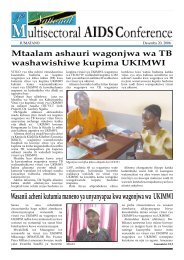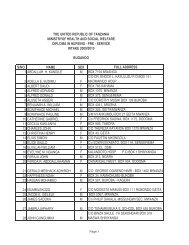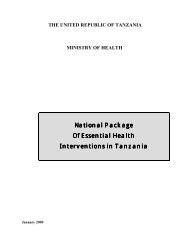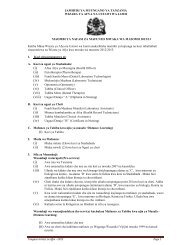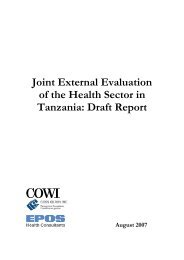Environmental and Social Management Framework for Tanzania ...
Environmental and Social Management Framework for Tanzania ...
Environmental and Social Management Framework for Tanzania ...
Create successful ePaper yourself
Turn your PDF publications into a flip-book with our unique Google optimized e-Paper software.
(iii) promoting a regional voice <strong>for</strong> member states in all matters of health at<br />
regional <strong>and</strong> international decision making <strong>for</strong>ums; <strong>and</strong><br />
(iv) advocating <strong>for</strong> greater attention <strong>and</strong> resources to strengthening laboratory<br />
capacity in the region.<br />
Participating countries will contribute a portion of the proceeds of their IDA credits <strong>for</strong><br />
coordination of these activities. Member states are the main source of ECSA's<br />
funding, contributing roughly 80 percent of ECSA’s total budget, with the balance<br />
provided by other donors <strong>and</strong> partners.<br />
Project Components<br />
The project includes two components as follows:<br />
Component 1: Specialized Diagnostic Services <strong>for</strong> TB <strong>and</strong> Other<br />
Communicable Diseases (US$42.5 million)<br />
This component will improve access to quality diagnostic techniques <strong>for</strong> TB <strong>and</strong><br />
other communicable diseases, by strengthening national public health laboratories<br />
as well as specialized satellite laboratories <strong>and</strong> putting in place systems <strong>for</strong><br />
laboratory management <strong>and</strong> surveillance. This would involve funding the following<br />
three mutually complementary set of activities:<br />
1. Networking National TB Reference Laboratories<br />
The Bank-funded regional project would assist to establish an East Africa<br />
network of national TB reference laboratories, to strengthen TB quality<br />
assurance <strong>and</strong> conduct epidemiological surveillance, including addressing the<br />
emergent threat of multi-drug resistant TB.<br />
The national TB reference laboratories would serve as models <strong>for</strong> prevention,<br />
control, <strong>and</strong> treatment ef<strong>for</strong>ts; acting as centres of excellence <strong>for</strong> knowledge<br />
generation <strong>and</strong> sharing. The laboratories would provide reference <strong>and</strong><br />
specialized services, including testing of new technologies. St<strong>and</strong>ardized<br />
quality assurance programs will be harmonized among the three East African<br />
national TB laboratories <strong>and</strong> inter-laboratory external quality assessments<br />
(EQA) would be supported. This would be an effective mechanism in the<br />
current absence of a Supranational Reference Laboratory.<br />
The regional project would establish the foundations <strong>for</strong> the East Africa<br />
laboratory network by first bolstering the capacities of the three national TB<br />
reference laboratories <strong>and</strong> subsequently assisting to put in place a<br />
Supranational Reference Laboratory (SRL). This would substantially boost<br />
Africa’s capacity as there is currently only one such laboratory in South Africa.<br />
As national capacities are enhanced <strong>and</strong> the network becomes fully<br />
functional, one of the three national TB reference laboratories (NTRL) will<br />
develop into a full Supranational Reference Laboratory. There is already an<br />
international commitment to establish such a supranational structure in East<br />
Africa <strong>and</strong> both the World Health Organization (WHO) <strong>and</strong> the TB Union have<br />
established processes <strong>for</strong> accrediting one of the laboratories to meet<br />
international st<strong>and</strong>ards.<br />
6



